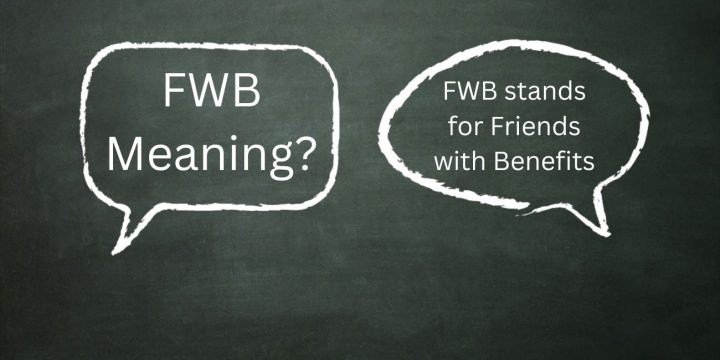In modern dating, the term FWB (Friends with Benefits) has become quite common. Whether you’ve encountered the term through friends, media, or social interactions, it’s essential to fully understand what it means and how it works.
In this article, we’ll dive deep into what FWB relationships are, how they work, the benefits and risks involved, and how to navigate these types of relationships in a healthy and respectful manner.
What Does FWB (Friends with Benefits) Mean?

FWB stands for Friends with Benefits, which refers to a type of relationship where two individuals maintain a platonic friendship but also engage in a sexual relationship. Unlike traditional romantic relationships, there is no emotional commitment or exclusivity. The main goal of an FWB relationship is to enjoy the physical aspects of a relationship without the expectations that come with dating or being in a committed relationship.
People enter into FWB relationships for various reasons—some may want the physical intimacy without the emotional complications, while others may simply enjoy the companionship and mutual benefits of the arrangement.
How Does a Friends with Benefits Relationship Work?
An FWB relationship works by balancing two aspects: friendship and physical intimacy. Here’s how it typically plays out:
- Clear Boundaries: Before diving into any sexual activities, it’s crucial for both parties to have a conversation about boundaries and expectations. For example, some people may want to limit the relationship to only physical intimacy, while others might want to maintain a deeper emotional connection.
- No Romantic Involvement: The most important aspect of an FWB relationship is that it’s not romantic. While you might have feelings for each other, there are no commitments or obligations like you would find in a romantic relationship.
- Mutual Respect: Respect is a key component in any relationship, but it becomes especially important in an FWB setup. Treating each other with respect means understanding each other’s needs, keeping lines of communication open, and ensuring that both individuals feel comfortable and safe throughout the relationship.
FWB relationships are based on mutual agreement and understanding, with both people agreeing that the bond will remain casual and physical, without the pressure of emotional commitment.
Benefits of an FWB Relationship

FWB relationships are appealing for various reasons, and many people find that they offer a way to enjoy intimacy without the complexities of a traditional romantic relationship. Here are some of the primary benefits:
- No Emotional Commitment: One of the biggest appeals of an FWB relationship is the lack of emotional commitment. You get the benefits of physical intimacy without the need for long-term promises, exclusivity, or emotional investment.
- Physical Satisfaction: For individuals who are sexually active but not looking for a committed partner, an FWB relationship offers a chance to satisfy physical desires without the need for romantic attachment.
- Maintaining Independence: Many people enjoy the ability to keep their independence while still engaging in physical intimacy. An FWB relationship allows you to focus on your own life, career, or personal goals without the responsibility of maintaining a traditional relationship.
- Avoiding the Drama: Some people enjoy the simplicity of an FWB setup because it’s often less complicated than traditional dating. There are fewer expectations, less drama, and less emotional entanglement involved.
Risks of an FWB Relationship
Although FWB relationships come with their benefits, they also have potential downsides. Here are the risks you should consider before engaging in an FWB arrangement:
Emotional Attachment
One of the biggest risks in an FWB relationship is that one person may develop romantic feelings for the other, which could lead to emotional complications. If one party begins to want more than just a physical connection, it can strain the relationship and lead to confusion or hurt feelings.
Jealousy
Even though FWB relationships are supposed to be non-exclusive, feelings of jealousy can emerge, especially if one person starts seeing other people. The lack of commitment can lead to feelings of insecurity, which can create tension between the two people involved.
Complicated Friendship
An FWB arrangement often starts with a friendship, but once physical intimacy is involved, the dynamics of the friendship can change. Sometimes, people might feel awkward afterward, and this could negatively affect the friendship, especially if the relationship doesn’t work out.
Sexual Health Risks
Like any sexual relationship, FWB arrangements come with potential health risks, including the possibility of sexually transmitted infections (STIs). Both parties must communicate openly about their sexual health and take precautions to protect themselves.
How to Have a Healthy FWB Relationship

If you’re considering entering into an FWB relationship, it’s important to approach it with clear communication and mutual respect. Here’s how to ensure the arrangement is healthy for both individuals:
1. Set Clear Boundaries
Before anything physical happens, both individuals need to have a conversation about their boundaries and expectations. This should include discussing things like how often you’ll see each other, what activities are acceptable, and whether or not either of you wants to remain sexually exclusive.
2. Keep Communication Open
Good communication is the foundation of any successful relationship, and FWB is no different. Check in with each other regularly about how the arrangement is going. Be open about your feelings and make sure both individuals are still comfortable with the situation.
3. Don’t Rely on Each Other for Emotional Support
Although you might share a friendship, an FWB relationship isn’t designed to fulfill emotional needs in the way a traditional romantic relationship does. Keep your emotional support systems separate, relying on friends, family, or other support channels instead.
4. Practice Safe Sex
Always use protection to minimize the risks of sexually transmitted infections (STIs) and unwanted pregnancies. Both individuals should get tested regularly to ensure their health and safety.
5. Be Honest About Your Feelings
If at any point either party starts to develop romantic feelings or wants to take the relationship in a different direction, it’s important to have an honest conversation. This prevents hurt feelings and helps keep the situation from getting complicated.
Is FWB a Good Idea for You?
Whether an FWB relationship is right for you depends on your emotional and physical needs. Some people thrive in casual relationships and find that an FWB setup works perfectly for their lifestyle. However, it’s not for everyone, especially if you’re someone who tends to develop emotional attachment quickly or struggles to separate physical intimacy from emotional connection.
If you value independence and are comfortable with non-committal relationships, an FWB arrangement might be a good fit. Just make sure that you and your partner are clear about the arrangement and are comfortable with the boundaries set.
Conclusion
Friends with Benefits (FWB) relationships are a modern approach to intimacy, offering the freedom of physical connection without the emotional baggage of romantic commitment. While they can be enjoyable and fulfilling for some, it’s essential to understand the risks involved, especially concerning emotional attachment and the potential impact on friendships. Clear communication, respect, and safe practices are vital to maintaining a healthy FWB relationship. If both parties are on the same page, an FWB arrangement can be a satisfying and low-pressure way to enjoy physical intimacy.
What’s your take on FWB relationships? Have you had any experiences or thoughts to share? Drop a comment below, and don’t forget to share this article with friends who might be curious about this modern relationship dynamic!

